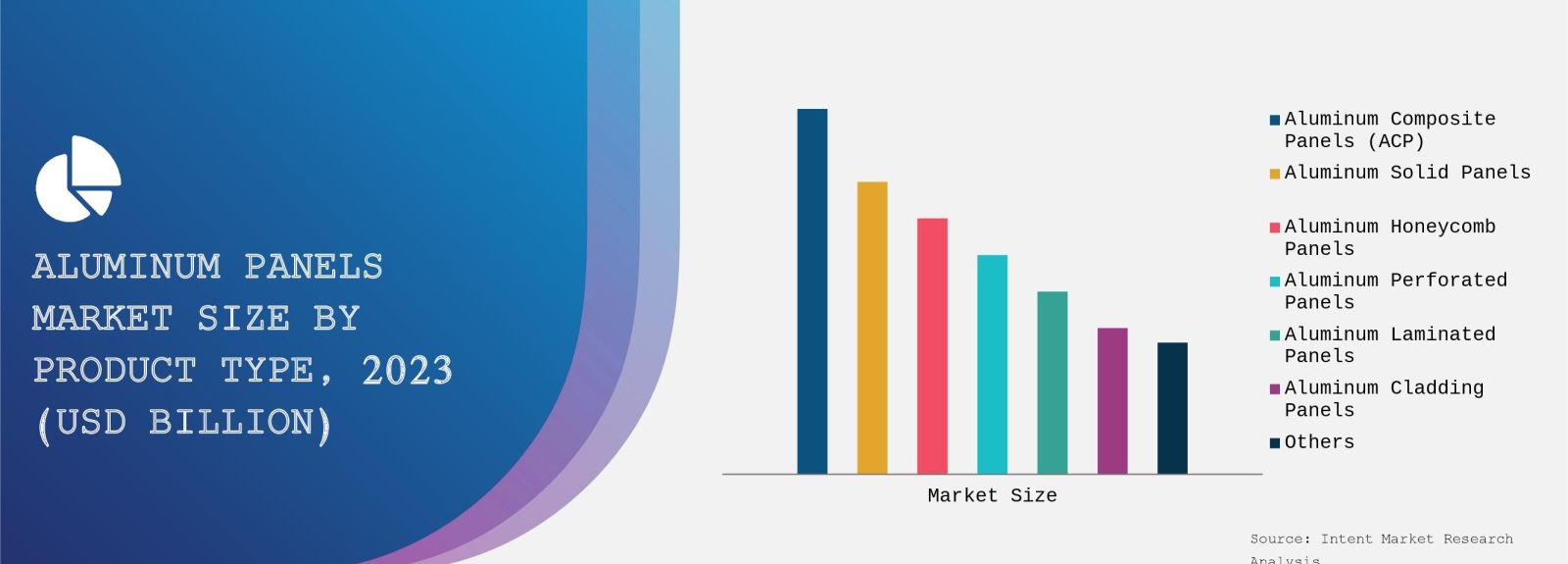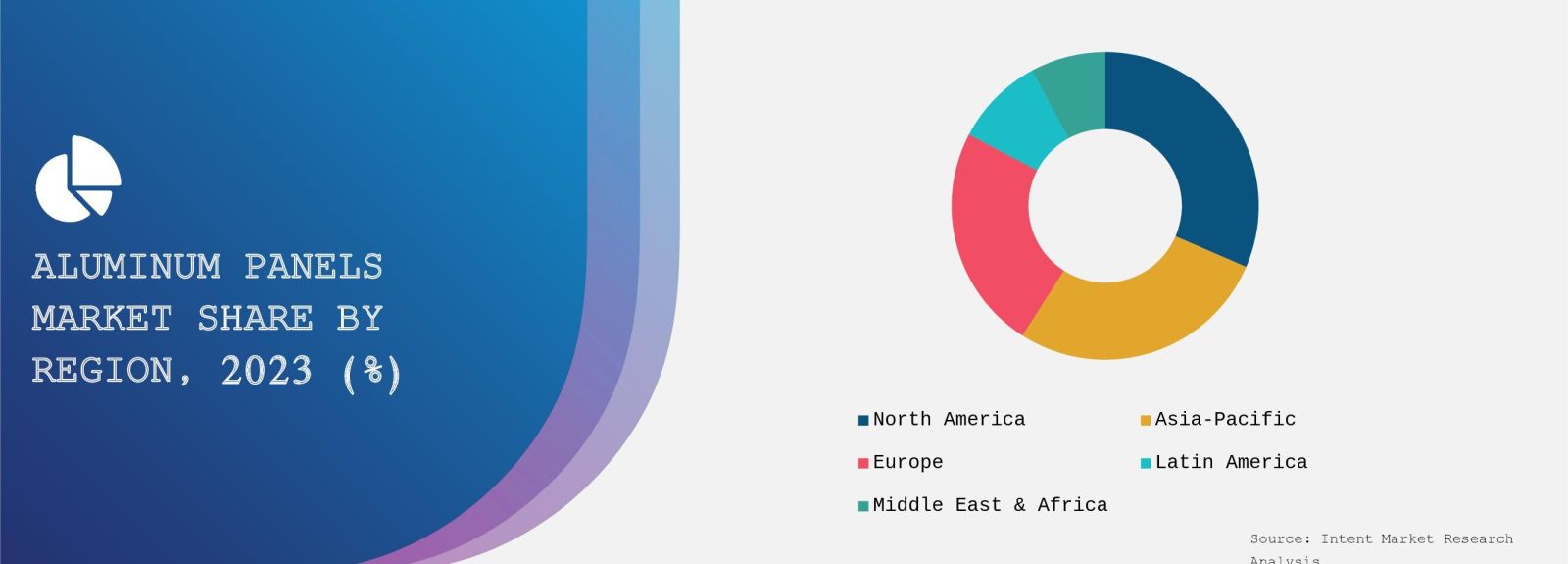As per Intent Market Research, the Aluminum Panels Market was valued at USD 23.4 billion in 2023 and will surpass USD 36.1 billion by 2030; growing at a CAGR of 6.4% during 2024 - 2030.
Aluminum Composite Panels Anticipated to Grow the Fastest
The Aluminum Composite Panels (ACP) segment is expected to grow the fastest within the aluminum panels market. This growth can be attributed to the increasing demand for lightweight, durable, and aesthetically pleasing materials in the construction and architecture sectors. ACPs are favored for their excellent insulation properties, resistance to weather, and ease of installation, making them a popular choice for building facades, signage, and interior applications. As urbanization continues and the need for innovative building materials rises, ACPs are poised to play a crucial role in meeting these demands.
Additionally, the rise in green building initiatives is further driving the adoption of ACPs, as they can contribute to energy efficiency and sustainable design practices. Their versatility in design, available finishes, and colors allow architects and builders to create visually appealing structures that meet modern aesthetic standards. As the construction industry increasingly shifts towards sustainable practices and innovative designs, the ACP segment is likely to see significant growth in the coming years.

Asia-Pacific is projected to have the largest market size during the forecast period
Asia-Pacific region is anticipated to be the largest market for aluminum panels, driven by rapid urbanization, industrialization, and infrastructure development in emerging economies such as China and India. The region's robust construction industry is a significant factor, as aluminum panels are extensively used in residential, commercial, and industrial projects. The increasing investment in infrastructure, including transportation, energy, and public facilities, is further fueling the demand for aluminum panels in construction applications.
Moreover, the Asia-Pacific region is witnessing a growing trend towards lightweight and sustainable building materials, aligning well with the characteristics of aluminum panels. With ongoing advancements in manufacturing processes and a focus on energy efficiency, the aluminum panels market in this region is expected to expand significantly. The combination of economic growth, increasing disposable incomes, and evolving consumer preferences for modern architecture will likely solidify Asia-Pacific's position as the largest market for aluminum panels.

The report focuses on estimating the current market potential in terms of the total addressable market for all the segments, sub-segments, and regions. In the process, all the high-growth and upcoming technologies were identified and analyzed to measure their impact on the current and future market. The report also identifies the key stakeholders, their business gaps, and their purchasing behavior. This information is essential for developing effective marketing strategies and creating products or services that meet the needs of the target market. The report also covers a detailed analysis of the competitive landscape which includes major players, their recent developments, growth strategies, product benchmarking, and manufacturing operations among others. Also, brief insights on start-up ecosystem and emerging companies is also included as part of this report.
Report Objectives:
The report will help you answer some of the most critical questions in the Aluminum Panels Market. A few of them are as follows:
- What are the key drivers, restraints, opportunities, and challenges influencing the market growth?
- What are the prevailing technology trends in the Aluminum Panels Market?
- What is the size of the Aluminum Panels Market based on segments, sub-segments, and regions?
- What is the size of different market segments across key regions: North America, Europe, Asia-Pacific, Latin America, Middle East & Africa?
- What are the market opportunities for stakeholders after analyzing key market trends?
- Who are the leading market players and what are their market share and core competencies?
- What is the degree of competition in the market and what are the key growth strategies adopted by leading players?
- What is the competitive landscape of the market, including market share analysis, revenue analysis, and a ranking of key players?
Report Scope:
|
Report Features |
Description |
|
Market Size (2023) |
USD 23.4 billion |
|
Forecasted Value (2030) |
USD 36.1 billion |
|
CAGR (2024 – 2030) |
6.4% |
|
Base Year for Estimation |
2023 |
|
Historic Year |
2022 |
|
Forecast Period |
2024 – 2030 |
|
Report Coverage |
Market Forecast, Market Dynamics, Competitive Landscape, Recent Developments |
|
Segments Covered |
Aluminum Panels Market By Product Type (Aluminum Composite Panels (ACP), Aluminum Solid Panels, Aluminum Honeycomb Panels, Aluminum Perforated Panels, Aluminum Laminated Panels, Aluminum Cladding Panels), By Thickness (Thin Panels (less than 3mm), Medium Panels (3mm to 6mm), Thick Panels (more than 6mm)), By Surface Finish (Anodized Finish, Powder Coated Finish, Brushed Finish, Mirror Finish), By Application (Construction, Automotive, Aerospace, Marine, HVAC Systems, Furniture) |
|
Regional Analysis |
North America (US, Canada, Mexico), Europe (Germany, France, UK, Italy, Spain, and Rest of Europe), Asia-Pacific (China, Japan, South Korea, Australia, India, and Rest of Asia-Pacific), Latin America (Brazil, Argentina, and Rest of Latin America), Middle East & Africa (Saudi Arabia, UAE, Rest of Middle East & Africa) |
|
Customization Scope |
Customization for segments, region/country-level will be provided. Moreover, additional customization can be done based on the requirements |
|
1. Introduction |
|
1.1. Market Definition |
|
1.2. Scope of the Study |
|
1.3. Research Assumptions |
|
1.4. Study Limitations |
|
2. Research Methodology |
|
2.1. Research Approach |
|
2.1.1. Top-Down Method |
|
2.1.2. Bottom-Up Method |
|
2.1.3. Factor Impact Analysis |
|
2.2. Insights & Data Collection Process |
|
2.2.1. Secondary Research |
|
2.2.2. Primary Research |
|
2.3. Data Mining Process |
|
2.3.1. Data Analysis |
|
2.3.2. Data Validation and Revalidation |
|
2.3.3. Data Triangulation |
|
3. Executive Summary |
|
3.1. Major Markets & Segments |
|
3.2. Highest Growing Regions and Respective Countries |
|
3.3. Impact of Growth Drivers & Inhibitors |
|
3.4. Regulatory Overview by Country |
|
4. Aluminum Panels Market, by Product Type (Market Size & Forecast: USD Million, 2022 – 2030) |
|
4.1. Aluminum Composite Panels (ACP) |
|
4.2. Aluminum Solid Panels |
|
4.3. Aluminum Honeycomb Panels |
|
4.4. Aluminum Perforated Panels |
|
4.5. Aluminum Laminated Panels |
|
4.6. Aluminum Cladding Panels |
|
4.7. Others |
|
5. Aluminum Panels Market, by Thickness (Market Size & Forecast: USD Million, 2022 – 2030) |
|
5.1. Thin Panels (less than 3mm) |
|
5.2. Medium Panels (3mm to 6mm) |
|
5.3. Thick Panels (more than 6mm) |
|
6. Aluminum Panels Market, by Surface Finish (Market Size & Forecast: USD Million, 2022 – 2030) |
|
6.1. Anodized Finish |
|
6.2. Powder Coated Finish |
|
6.3. Brushed Finish |
|
6.4. Mirror Finish |
|
6.5. Others |
|
7. Aluminum Panels Market, by Application (Market Size & Forecast: USD Million, 2022 – 2030) |
|
7.1. Construction |
|
7.2. Automotive |
|
7.3. Aerospace |
|
7.4. Marine |
|
7.5. HVAC Systems |
|
7.6. Furniture |
|
7.7. Others |
|
8. Regional Analysis (Market Size & Forecast: USD Million, 2022 – 2030) |
|
8.1. Regional Overview |
|
8.2. North America |
|
8.2.1. Regional Trends & Growth Drivers |
|
8.2.2. Barriers & Challenges |
|
8.2.3. Opportunities |
|
8.2.4. Factor Impact Analysis |
|
8.2.5. Technology Trends |
|
8.2.6. North America Aluminum Panels Market, by Product Type |
|
8.2.7. North America Aluminum Panels Market, by Thickness |
|
8.2.8. North America Aluminum Panels Market, by Surface Finish |
|
8.2.9. North America Aluminum Panels Market, by Application |
|
8.2.10. By Country |
|
8.2.10.1. US |
|
8.2.10.1.1. US Aluminum Panels Market, by Product Type |
|
8.2.10.1.2. US Aluminum Panels Market, by Thickness |
|
8.2.10.1.3. US Aluminum Panels Market, by Surface Finish |
|
8.2.10.1.4. US Aluminum Panels Market, by Application |
|
8.2.10.2. Canada |
|
8.2.10.3. Mexico |
|
*Similar segmentation will be provided for each region and country |
|
8.3. Europe |
|
8.4. Asia-Pacific |
|
8.5. Latin America |
|
8.6. Middle East & Africa |
|
9. Competitive Landscape |
|
9.1. Overview of the Key Players |
|
9.2. Competitive Ecosystem |
|
9.2.1. Level of Fragmentation |
|
9.2.2. Market Consolidation |
|
9.2.3. Product Innovation |
|
9.3. Company Share Analysis |
|
9.4. Company Benchmarking Matrix |
|
9.4.1. Strategic Overview |
|
9.4.2. Product Innovations |
|
9.5. Start-up Ecosystem |
|
9.6. Strategic Competitive Insights/ Customer Imperatives |
|
9.7. ESG Matrix/ Sustainability Matrix |
|
9.8. Manufacturing Network |
|
9.8.1. Locations |
|
9.8.2. Supply Chain and Logistics |
|
9.8.3. Product Flexibility/Customization |
|
9.8.4. Digital Transformation and Connectivity |
|
9.8.5. Environmental and Regulatory Compliance |
|
9.9. Technology Readiness Level Matrix |
|
9.10. Technology Maturity Curve |
|
9.11. Buying Criteria |
|
10. Company Profiles |
|
10.1. Alcoa |
|
10.1.1. Company Overview |
|
10.1.2. Company Financials |
|
10.1.3. Product/Service Portfolio |
|
10.1.4. Recent Developments |
|
10.1.5. IMR Analysis |
|
*Similar information will be provided for other companies |
|
10.2. Aluminum Corporation of China |
|
10.3. Arconic |
|
10.4. Constellium |
|
10.5. Hindalco |
|
10.6. Jindal Aluminium |
|
10.7. Kaiser Aluminum |
|
10.8. Mitsubishi Chemical |
|
10.9. Norsk Hydro |
|
10.10. UACJ Corporation |
|
11. Appendix |
A comprehensive market research approach was employed to gather and analyze data on the Aluminum Panels Market. In the process, the analysis was also done to analyze the parent market and relevant adjacencies to measure the impact of them on the Aluminum Panels Market. The research methodology encompassed both secondary and primary research techniques, ensuring the accuracy and credibility of the findings.
.jpg)
Secondary Research
Secondary research involved a thorough review of pertinent industry reports, journals, articles, and publications. Additionally, annual reports, press releases, and investor presentations of industry players were scrutinized to gain insights into their market positioning and strategies.
Primary Research
Primary research involved conducting in-depth interviews with industry experts, stakeholders, and market participants across the Aluminum Panels ecosystem. The primary research objectives included:
- Validating findings and assumptions derived from secondary research
- Gathering qualitative and quantitative data on market trends, drivers, and challenges
- Understanding the demand-side dynamics, encompassing end-users, component manufacturers, facility providers, and service providers
- Assessing the supply-side landscape, including technological advancements and recent developments
Market Size Assessment
A combination of top-down and bottom-up approaches was utilized to analyze the overall size of the Aluminum Panels Market. These methods were also employed to assess the size of various subsegments within the market. The market size assessment methodology encompassed the following steps:
- Identification of key industry players and relevant revenues through extensive secondary research
- Determination of the industry's supply chain and market size, in terms of value, through primary and secondary research processes
- Calculation of percentage shares, splits, and breakdowns using secondary sources and verification through primary sources
.jpg)
Data Triangulation
To ensure the accuracy and reliability of the market size, data triangulation was implemented. This involved cross-referencing data from various sources, including demand and supply side factors, market trends, and expert opinions. Additionally, top-down and bottom-up approaches were employed to validate the market size assessment.
NA
